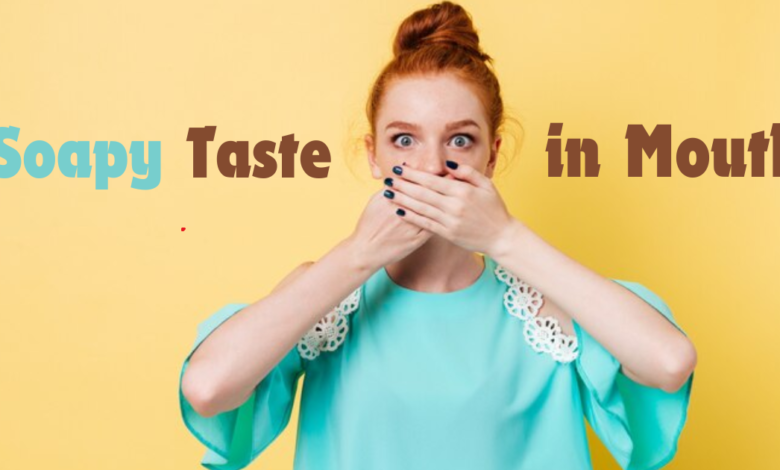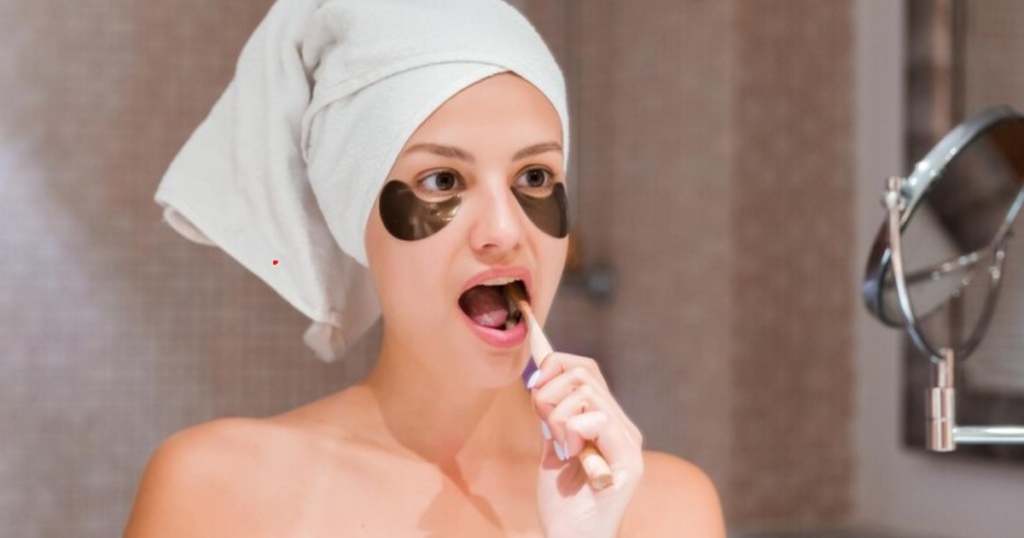Soapy Taste in Mouth: Causes, Treatments, and Prevention

Do you sometimes taste something like soap in your mouth and wonder why? You’re not the only one! This strange taste can mean more than just a little problem—it could be a sign of different things going on inside your body. Let’s find out what makes soapy taste in your mouth, how to fix it, and ways to stop it from happening again.
What is a Soapy Taste in the Mouth?
A soapy feeling in the mouth is precisely what it sounds like—it tastes like soap. It can be highly uncomfortable and last for varied periods of time, depending on the cause. Understanding why it happens is the first step toward dealing with it properly.
What Causes a Soapy Taste in The Mouth?
1. Residual Soap or Detergent
One of the most simple causes for a soapy taste in the mouth is the consumption of leftover soap or detergent. This can occur if dishes are not properly rinsed after washing, leaving soap particles that can adhere to the surfaces of cups, plates, or utensils. When these particles come into touch with food or drink, they might leave a soapy taste.
2. Medication Side Effects
Certain drugs might produce a soapy taste as a side effect. This is especially prevalent with drugs that affect saliva production or composition. Some antibiotics, antihistamines, and psychiatric medicines have been shown to alter taste perception, including the feeling of a soapy or metallic taste.
3. Dental Hygiene Products
Mouthwashes, toothpastes, and other dental care products may contain chemicals that cause a soapy taste in the mouth. Ingredients like sodium lauryl sulfate (SLS), which is widely present in toothpaste, can linger in the tongue and leave an unpleasant soapy taste.
4. Dry Mouth (Xerostomia)
Dry mouth, also known as xerostomia, is characterized by inadequate saliva production. Saliva is essential for maintaining a healthy mouth environment and perceiving taste. Reduced saliva production can cause changed taste sensations, such as a soapy taste.
5. Gastroesophageal Reflux Disease (GERD)
GERD is a disorder in which stomach acid repeatedly rushes back into the esophagus, producing irritation. Acid reflux can occasionally enter the lips, resulting in a sour or soapy taste. Managing GERD with dietary modifications and medications can help alleviate the discomfort.
6. Oral Infections
Infections in the mouth, such as oral thrush or periodontal disease, can affect taste perception. These illnesses can cause a metallic, bitter, or soapy taste due to the presence of bacteria or fungi in the oral tissues.
7. Contaminated Water Supply
A soapy taste in the mouth can sometimes be caused by polluted water. Water pollution with chemicals or detergents can give drinking water a soapy flavor. Keeping your water source clean and free of toxins is critical for avoiding this problem.
8. Consumption of Certain Foods
Certain foods and beverages might leave a soapy taste in your mouth. For example, eating unwashed fruits and vegetables that have been treated with soap or detergent can introduce these compounds into your mouth. Furthermore, several natural chemicals in foods, such as coriander (cilantro), might have a soapy flavor for some people due to genetic variances in taste perception.
9. Food Allergies or Sensitivities
Food allergies or sensitivities can occasionally appear as changes in taste perception. Individuals who are sensitive to certain additives or preservatives in processed meals, for example, may feel a soapy taste after eating them.
10. Chemical Exposure
Certain pollutants in the environment or workplace can cause a soapy taste in your mouth. Pesticides, solvents, and industrial cleaners can be swallowed or inhaled, causing altered taste sensations. When working with such compounds, it is critical to take precautions and adhere to safety rules.
11. Neurological Conditions
Neurological disorders that alter the nerves responsible for taste can cause abnormal taste impressions. Bell’s palsy, multiple sclerosis (MS), and stroke can all affect the taste buds and how the brain processes taste signals, resulting in a soapy flavor.
12. Hormonal Changes
Hormonal changes, particularly those caused by pregnancy, menopause, or thyroid diseases, might alter taste perception. These hormonal swings might cause a soapy or metallic taste in the mouth.

How to Get Rid Of Soapy Taste In Mouth?
1. Improve Oral Hygiene
Proper brushing and flossing are essential to maintaining oral health and preventing any unusual tastes. Follow these steps to ensure thorough oral hygiene:
- Brush your teeth twice daily using a fluoride toothpaste.
- Use a tongue scraper to remove any residue from your tongue.
- Floss daily to remove food particles between your teeth.
- Consider using an alcohol-free mouthwash to rinse away any lingering particles.
2. Rinse Your Mouth
If you believe that residual soap or detergent is the culprit, properly rinse your mouth with water. Drinking plenty of water can help remove any remaining soap particles.
3. Stay Hydrated
Dry mouth can contribute to a soapy taste. Ensuring adequate hydration can help:
- Drink plenty of water throughout the day to maintain saliva production.
- Chew sugar-free gum or suck on sugar-free candies to stimulate saliva flow.
4. Check Your Diet
Certain foods can leave a soapy taste in the mouth, particularly if they have been treated with soap or detergent. To prevent this:
- Wash fruits and vegetables thoroughly before consumption.
- Avoid foods that you suspect may cause this sensation.
5. Review Medications
If you feel a drug is creating the soapy taste, speak with your doctor. They may change your dosage or recommend another medicine that does not cause this adverse effect.
6. Address Underlying Health Conditions
If the soapy taste is related to an underlying health condition such as GERD, oral infections, or dry mouth, addressing these conditions can help alleviate the taste:
- For GERD, consider lifestyle changes such as avoiding trigger foods, eating smaller meals, and elevating the head of your bed. Medications like antacids and proton pump inhibitors may also be helpful.
- For oral infections, consult with a dentist for appropriate treatment, such as antibiotics or antifungal medications.
- For dry mouth, your healthcare provider may recommend saliva substitutes or medications that stimulate saliva production.
7. Avoid Contaminated Water
Make sure your drinking water is pure and free of toxins. A dependable water filtration system can assist eliminate any pollutants that may generate a soapy flavor.
8. Limit Chemical Exposure
Exposure to certain chemicals in the environment or workplace can lead to a soapy taste. Taking protective measures can help:
- Use protective gear such as gloves and masks when handling chemicals.
- Follow safety guidelines and protocols to minimize exposure.
9. Practice Good Dental Hygiene
Using dental products that are free of harsh chemicals can help to eliminate the soapy taste. Choose toothpaste and mouthwash without sodium lauryl sulfate (SLS) or other irritants.

When to See a Doctor
If the soapy taste in your mouth persists despite these precautions, it could indicate an underlying medical condition that necessitates professional treatment. Consult with your doctor or dentist for a comprehensive examination and proper treatment.
Read More: Can I Drink Soda After Tooth Extraction? When Can I Drink?
Conclusion
When you feel soapy taste in your mouth, it can happen because of different reasons like not brushing your teeth well or having health problems. Knowing why it happens is the first step to fixing it. If you take good care of your mouth and do things to prevent it, you can keep your taste buds healthy and not have bad tastes.
People Also Ask
Why does my mouth taste like soap?
A soapy taste in your mouth can occur for a variety of reasons. Sometimes it happens because you mistakenly ate or drank anything with soap on it, such as a glass or a spoon. Other instances, it could be due to specific meals, medications, or even dental difficulties. If the problem persists, consult a doctor or dentist to determine the cause.
Can toothpaste cause a soapy taste in my mouth?
Yes, toothpaste can occasionally leave a soapy taste in your mouth. This can occur if you don’t thoroughly rinse your mouth after brushing. Some toothpaste components, such as sodium lauryl sulfate, can also produce this taste. Switching to a different brand or rinsing more thoroughly may help.
What foods can cause a soapy taste in my mouth?
Some foods can have a soapy flavor, particularly if they contain certain chemicals or preservatives. Cilantro is one example: some people have a gene that causes cilantro to taste soapy. In addition, fruits and vegetables that have not been thoroughly washed may still contain cleaning agent residue.
Is a soapy taste in my mouth a sign of a health problem?
It can happen, but not always. If the soapy taste persists, it could indicate a dental problem, a medication reaction, or even an early indicator of a health condition. If you’re concerned, consult with a healthcare expert to ensure that everything is fine.
How can I get rid of the soapy taste in my mouth?
To get rid of the soapy taste, drink plenty of water and rinse your mouth well. Brushing your teeth and tongue might also help. Avoid eating meals that may contain soap, and ensure that your dishes and utensils are thoroughly rinsed. If the problem persists, consult a doctor or dentist to determine the cause.




